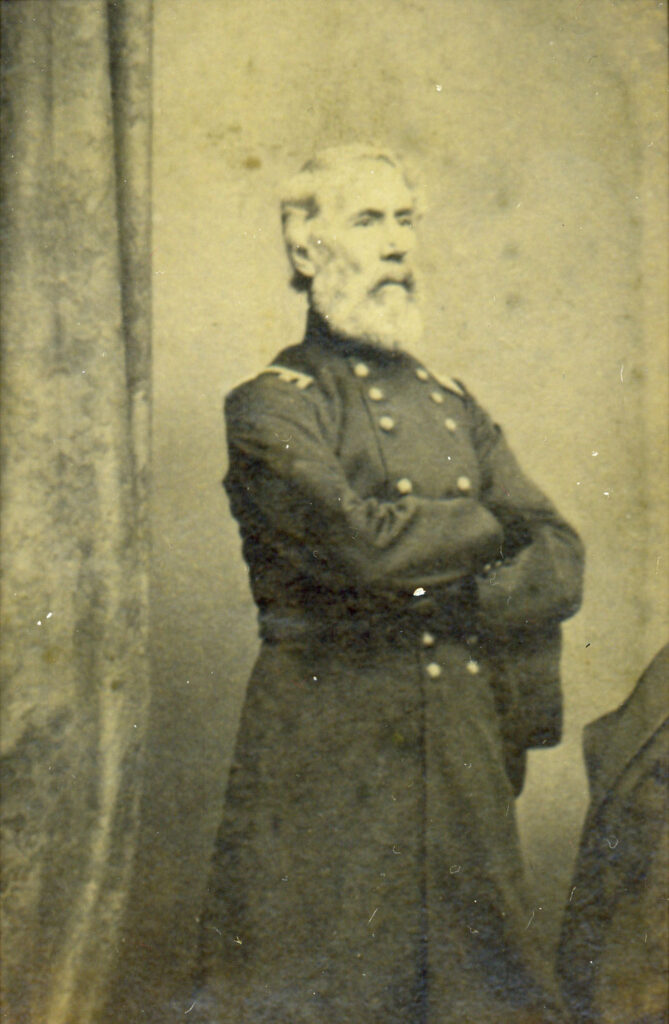Section #18 - After harsh political debates the Supreme Court’s Dred Scott decision fails to resolve slavery
Chapter 206: Pierce Sends Federal Troops To Disband The Topeka Legislature
Summer 1856
Colonel Edwin Sumner Commands The First U.S. Cavalry Regiment
One day after the Toombs Bill is stalled in Congress, the Pierce administration and Governor Wilson Shannon take another step toward trying to stamp out the Free State government in Topeka.

A prior attempt to do so has led to the imprisonment on May 10, 1856, of Charles Robinson, the acting Free State Governor. He is currently in a jail in Lecompton, facing charges of treason, and fearing an imminent execution.
Since then, however, civil disorder has only accelerated with the sack of Lawrence on May 21 and John Brown’s attacks at Pottawatomie on May 24 and at Black Jack on June 2.
The question of how best to restore order falls back on Shannon, along with President Pierce and his Secretary of War, Jefferson Davis. The Lawrence incident proves that the Kansas militia is more likely to exacerbate the conflict rather than resolve it. Hence Shannon pleads for more direct assistance from Federal troops under the command of Colonel Edwin “Bull” Sumner, whose headquarters are at Ft. Leavenworth.
Sumner is fifty-nine years old and a career army officer, having served in the Mexican War and several frontier campaigns against various tribes. Shannon requests his help with general policing activities, monitoring the roads and dispersing any suspect marauders. Sumner makes good progress on this, and before a scheduled reassignment, Shannon asks him on June 23 to tackle one final mission in the town of Topeka.
July 4, 1856
Sumner Disbands The Topeka Legislature
The task involves a “Grand Mass Convention At Topeka” scheduled to coincide with the celebration of Independence Day and prepare for the next session of the Free State Legislature.
Shannon asks Sumner to “disperse” the attendees, “peacefully, if you can, forcibly if necessary” and cites for him the legal grounds for his request. In response Sumner assembles a force of five cavalry and two artillery units, and camps on the outskirts of Topeka on July 3 to confer with civilian authorities on a plan.
The celebrations are under way on the Fourth when Marshal Donelson and Judge Rush Elmore enter Constitution Hall to inform the assembled legislature that it is acting illegally and must disperse – either voluntarily or in response to Colonel Sumner’s federal troops. The stunned officials send Donelson on his way, and then agree not to resist the judge’s order.
When Sumner marches into Topeka, he deploys his forces and then handles the situation in a calm and reassuring fashion. He tells the crowd that his intent is neither to interfere with the Independence Day events not to disarm the Topeka militia – rather to just prevent the legislature from convening. He is received into the hall itself and sits quietly until an attempt is made to call the meeting to order. At that point he rises and speaks out:
Gentlemen, I am called upon this day to perform the most painful duty of my life. Under the authority of the President’s Proclamation I am here to disperse this Legislature and therefore inform you that you cannot meet. I therefore in accordance with my orders command you to disperse. God knows I have no party feeling and will hold none so long as I hold my present position in Kansas. I have just returned from the borders where I have been sending home companies of Missourians and now I am here to disperse you. Such are my orders that you must disperse. I now command you to disperse. I repeat that this is the most painful duty of my whole life. But you must disperse.
He is asked by one of the thirty-five members present if “the bayonet” will be used should they resist, and when he answers in the affirmative, a call to adjourn empties the room.
Colonel Sumner has done his duty, and in a fashion that actually earns him “three cheers” as he leads his troops out of the town. The Free Staters are angered by the outcome, but their wrath is reserved for Shannon and Pierce, and not for Sumner.